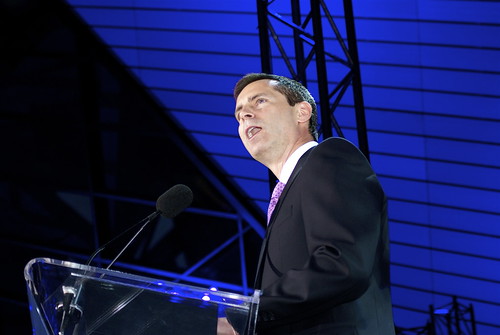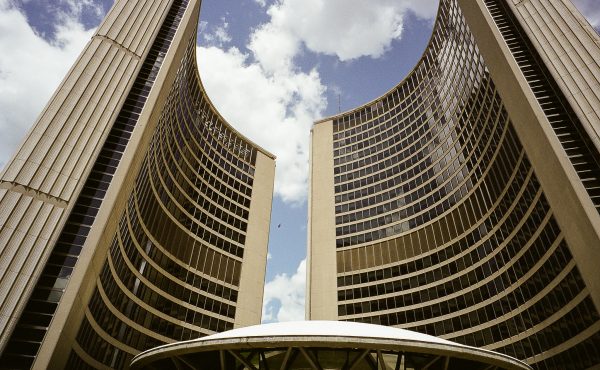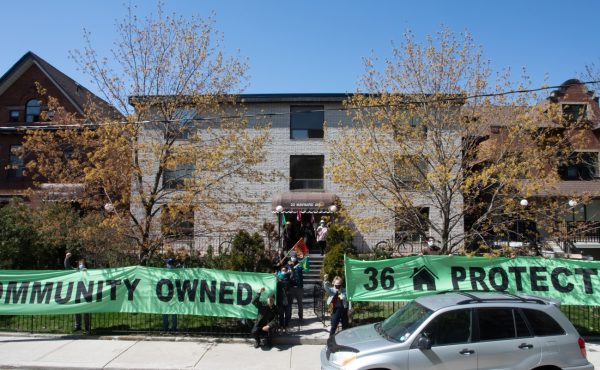
As Toronto Star columnist Jim Coyle wrote today, the art of asking a good question during question period at Queen’s Park (and Parliament Hill for that matter) has gone the way of the dodo. Coyle’s advice to the opposition parties: ask simple and direct questions.
Coyle’s logic seems to hold water. During today’s question period, NDP MPP Peter Tabuns had the opportunity to expose a glaring double standard held by the Liberals. Mr. Tabuns could have pointed out that while the Liberals were in opposition, they, led by now-Premier Dalton McGuinty, decried the Mike Harris government’s decision to axe the 50-50 operating funding agreement with transit commissions across the province but haven’t come close to getting back to the 50-50 deal since becoming the governing party. Instead, the MPP for Toronto-Danforth put forward a simple question that caused Minister of Transportation Jim Bradley, a politician for more than three decades, fits: “Will the Premier commit to providing 50% provincial operating funds for municipal public transit?â€
Here’s what ensued, courtesy the legislative transcript:
Mr. Peter Tabuns: Will the Premier commit to providing 50% provincial operating funds for municipal public transit?
Hon. Dalton McGuinty: To the Minister of Transportation.
Hon. James J. Bradley: As the member would well know, we made a commitment before the 2003 election as a government that we would share with the municipalities two cents of the gas tax. You know that the gas tax is 14.7 cents, no matter whether it’s a dollar a litre or 50 cents a litre. Whatever it happens to be is what the provincial government gets. It is not an ad valorem tax. We decided that we would share with the municipalities those funds for transit purposes; that is, to enhance, to expand, to improve upon public transit in those municipalities.
This year, somewhere in the neighbourhood of $314 million of funding was transferred to the municipalities. In addition to that, you will know that our government made additional funding available in March of this year to municipalities because they were facing special challenges in regard to their transit systems. With this money, they’ve utilized that for very good purposes. This has allowed them to spend the money that they need on operations while we assist very significantly with the capital end of things.
Mr. Peter Tabuns: Although I appreciate the technique of the minister for not addressing the question, I have to come back: When will you make that commitment and restore that funding-50%-for operating?
Hon. James J. Bradley: You would be aware, for instance-there’s a note coming in here. It says, “Gas tax at tab 17 and TTC note at tab 39.” [Ed. Note: Minister Bradley could be seen receiving a small piece of paper from a page; the “tab†references his binder with his key messages to help him stay on message.]
Hon. James J. Bradley (answering hecklers): Yes, I should know this.
Let me say this-
The Speaker (Hon. Steve Peters): Speak to the question, please.
Hon. James J. Bradley: I will definitely speak to the question. The question I’m speaking to is one where you will see the unprecedented investments being made by the provincial government in Move 2020. The area in which you have a specific interest in particular, that of the greater Toronto area, you will know that we have committed a plan that would involve the expenditure of some $17.5 billion, the largest in the history not only of Ontario, but the largest in the history-
The Speaker (Hon. Steve Peters): Thank you. New question?
Photograph by Word Freak.




11 comments
yes. transit funding. non-committal acceptance of undertaken obligations is something of an issue.
but NOTHING compared to MTO’s somewhat FLAWED driver education and enforcement. the unending obligatory enduring of journalists ranting about their ignorance of the HTA is an unending embarrassment. why is the Minister of Transportation unwilling or unable to see education and assessment are done capably? that those incapable are denied licencing? that those found driving without valid licences see criminal charges?
motor vehicles have been proven repeatedly very convenient weapons. the unwillingness of our police to recognise this is indeed happening is criminal if it can be demonstrated willful. that the police in some such cases have reverted to treating the victims as authors of their own circumstances says alot for the level of violence we tolerate on our streets. this being the case why are we still surprised when those raised in isolated islands of high density surrounded by anti pedestrian motorholic convenienceways take guns to settle their differences?
Reading that transcript felt like watching an episode of “Yes, (Prime) Minister!” I’d be laughing if it wasn’t true!
Having just recently had a bad run-in with a couple of horribly ignorant and dangerous motorists while cycling, I very much second Geoffrey’s comments! Here here!
The only thing this demonstrates is that question period is irrelevant.
Yes, we should remember that driving is a privilege and not a right; but I also will sometimes grrrump at some cyclists…
However to focus on the question and article – thanks for giving this exposure. And while it’s a very good point, the NDPers at Council haven’t been so straight up with the multi-millions with the Front St. road folly and the WWLRT. Within the 1993 WWLRT EA, it says very clearly that the WWLRT isn’t good value as it won’t be direct enough into the core, and a direct line in should be studied, including on Front St. But that never happened – and even now, the EAs won’t be doing so well to analyze a good direct route. As these two projects may cost about $800 to $900M, simply getting more $ doesn’t make up for being a bit blindp on sensible transit. I don’t accept too much of a diff between capital and operating dollars; and despite all the faults of the provincial Libeals, they have invested smartly in longer GO trains through the Front St./WWLRT corridor.
I worry about the sped-up transit EA processes too, and how some projects eg. Bloor Transformation Project are evading EAs – if you’re looking for more pointed questions to ask, Peter.
And Geoffrey has a reason to be on edge – another “cause” for us.
^^ That’s considered “focus(ing) on the question and article?” Gimme a break, Hamish.
Bradley could learn from Hamish how to twist a response on one question into something totally different, over and over and over again.
——–
Back to the point – 50% funding. Would the 50% funding mentioned here mean that TTC reliance on the farebox would drop to below 50% (with other revenue from advertising, etc. making up the remainder)? Or does that 75-80% figure that is oft quoted for the farebox share of funding include capital, so that a 50% provincial operating figure would nudge farebox share overall down to, say 60%?
In any case, the legislation I would be interested in would be something that guarantees funding such that the share of TTC revenue from the farebox does not exceed an average based on an index of, say, 10 large US and Canadian cities. (This figure is probably around 55%) This is not a crazy idea — the NHL players agreement is based on a share of league revenue, and the recent TTC deal gives drivers a salary based on suburban jurisdictions. Tricky, but it can be done.
It’s simply unacceptable to be the single most underfunded large transit agency on the continent and people should not stand for it. It’s not about waste, since a smaller budget would only push the farebox share higher. The numbers don’t lie – something is wrong with TTC funding. Politicians like Bradley should continue to be pressed until this situation is acknowledged and something is done to permanently fix it.
Back to the point – 50% funding. Would the 50% funding mentioned here mean that TTC reliance on the farebox would drop to below 50%
Uncertain. What this is a reference to is that the province commits to match municipal spending on public transit dollar for dollar, or, essentially, pays for half of the annual operating subsidy of public transit agencies across the province.
How much that subsidy covers is a whole different budget process. But it would ease up the burden on City of Toronto taxpayers a bit, and allow City Council more room in perhaps bulking up TTC services, reducing fares, or investing property tax dollars elsewhere.
Before 1996, when the provincial government paid for half of the TTC’s operating subsidy, the TTC’s farebox recovery was still 68%, close to a continental high.
I hope he asks the same question tomorrow, verbatim.
Aren’t you glad you rewarded the Liberals with 18 of 22 seats in 416 last year? To be fair, John Tory makes Dalton McGuinty looks like Churchill.
While we’re on the subject of provincial funding, when will Queen’s Park deal with the following issue:
If we want to build an expressway, Queen’s Park pays 100%.
If we want to build a subway or LRT, Queen’s Park expects Ottawa to pick up 1/3 of the tab which, in practice, means a lot of things don’t get built.
So much for “balanced transportation”.
geoffrey must be some kind of clone of James Bradley as his comment shows he has a knack for writing way off topic. His segue into what he was commenting on is a stretch to call it a tangent from the subject of the article.
That said, geoffrey follows second to hamish wilson in this respect.
To comment to the subject of the article, a number of years ago I once heard a federal MP addressing a group of students say, “Question period is a joke – it certainly isn’t Answer Period.”